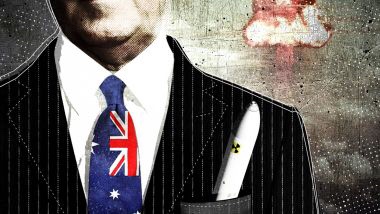 Why Australia might be forced to consider nuclear weapons
Why Australia might be forced to consider nuclear weaponsTony Walker
Jan 12, 2018
Dr Strangelove or: How I Learned to Stop Worrying and Love the Bomb is a 1964 black comedy produced and co-written by Stanley Kubrick and starring Peter Sellers and George C. Scott.
It suggests a mad American general could launch a nuclear attack against the Soviet Union – without the president's authorisation – to defend the purity of "our bodily fluids" from communist subversion.
Fifty years on from Strangelove's release it's not an irrelevant question to ask whether America has in place fail-safe mechanisms to prevent just such a nuclear accident; nor is it out of order to note the beginning of a debate – in the shadows – about Australia going nuclear.
What this has to do with Dr Strangelove might seem a stretch, but when discussion turns to the nuclear option it is best not to lose sight of the surreal.
Not since the John Gorton era of the late 1960s – cabinet documents confirm discussion then – has the possibility of Australia becoming a nuclear power been canvassed, except on the margins of the defence debate, and in top secret advice to the government of the day.
However, in recent weeks the issue has found its way crabwise into public domain via contributions from defence analysts Paul Dibb, Richard Brabin-Smith, and Hugh White in his Quarterly Essay, Without America.
White is cautious, but in his examination of Australia's defence policy options in a contested security future he suggests we may need to re-examine the nuclear option. To be clear, he is not recommending this course of action. He is simply noting the option.
In a newspaper op-ed Dibb asks the question: in what circumstances might Australia acquire its own nuclear weapons deterrent and thus abandon its commitment to the Treaty on the Non-Proliferation of Nuclear Weapons?
Dibb notes that from time to time advice to cabinet in the 1970s and 1980s was that Australia should "review periodically" Australia's "potential for the development of nuclear weapons".
Such a review could be triggered by a breakdown in international order, the fragmentation of the NPT regime, and a breakout nuclear arms race in Asia and/or the Middle East.
These are scenarios that hardly bear contemplating.
Andrew Davies of the Australian Strategic Policy Institute says of the Dibb, Brabin-Smith, White theses that the "logical endpoint" of their analysis is an Australian nuclear weapons capability. This would be prompted by America no longer being willing – or able – to provide a deterrent shield for its allies in the region.
Despite concerns about an erratic Donald Trump administration, and talk of American "decline", there is little or no sign of a US pullback from its regional security responsibilities at this stage, nor any conspicuous weakening in its willingness to maintain its nuclear deterrent capabilities.
However, what is clear, in Davies' words for this column, is that "we have reached the end of a period during which defence was more or less an academic exercise when there was no credible threat".
China's rise has "upended" those calculations.
Or, as White puts it provocatively: "America will lose, and China will win. America will cease to play a major strategic role in Asia, and China will take its place as the dominant power."
Defence strategists may have toyed in the past with various defence postures including "forward defence", and "continental defence", but those debates tended to occur in a vacuum in the absence of real live challenges to Australia's security.
That is no longer the case.
It's against this background – speaking of idiosyncratic generals – that newly-confirmed Coalition senator Jim Molan entered the defence debate this week in full battle mode by pointing out Australia's vulnerabilities.
Since General Molan declined to return phone calls I have no idea what his views are on a nuclear capability, but he is certainly not averse to Australia muscling up militarily. He favours increased defence spending, and is not reticent in expressing reservations about the US coming to Australia's aid "in an extreme scenario".
In an op-ed in The Australian he warned Australia could be "reduced to impotence in less than a week" if it failed to "address its vulnerabilities on fuel security and high-end weapons holdings".
What Molan appears to be saying is that given our current levels of defence preparedness we would be vulnerable in the event of a genuine threat to our security in a world in which the US was no longer the dominant power.
"If 2 per cent was an appropriate level of defence spending for Australia when America dominated the world, the question I have is whether that same level of defence spending is appropriate now when American power itself has relatively declined," he says.
Molan has a point. His presence in the Senate and on a national stage will ensure discussion about defence preparedness is elevated in the public discourse.
We should prepare ourselves for some Mad Max scenarios.
In the Kubrick classic – prompted by the actions of a mad general – it might be recalled that failure by the Soviets to advise America of a deterrent "Doomsday Machine" – in the event of a nuclear strike – causes a nuclear Armageddon.
Welcome to a brave new 2018.
Tony Walker is a vice-chancellor's fellow at La Trobe University and a Fairfax Media columnist.
No comments:
Post a Comment